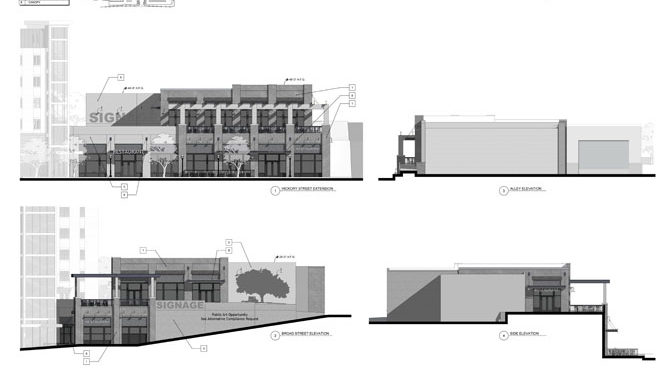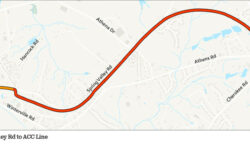The time has come, Athens.
After nearly two years, we’re finally getting the public hearing we wanted on Selig Enterprises’ development at the Armstrong & Dobbs property near the intersection of East Broad and Oconee streets. It’s too bad not many people seem to be paying attention anymore.
When rumors of Selig’s plans began to leak in 2011, downtown merchants freaked out because the anchor tenant was supposed to be a killing 90,000 square foot Walmart. There were rallies and a Patterson Hood protest song and a “buy local” sign in just about every window.
The Main Street killing low-cost leader later backed out (if it was ever interested in the first place), and the furor died down. Selig fired its architect, scaled back the big box (now rumored to be an L.A. Fitness gym) and made other changes, releasing a new set of plans in right before Christmas. Athens yawned.
Those plans were officially filed last month, and at 7 p.m. Thursday, June 6, in the Dougherty Street Governmental Building, the Athens-Clarke County Planning Commission will consider Selig’s request for ground-floor residential in part of the development. Along with a subsequent ACC Commission meeting Tuesday, July 2—assuming the planning commission issues a recommendation this month—this will be Athens’ residents sole opportunity to influence a massive development that will dwarf every building in the city except Sanford Stadium, a virtual second downtown catty corner to the original one.
ACC’s zoning code requires commercial space on the ground floor of residential buildings. That rule is, development by development, slowly helping to shape Athens into a New Urban community where everything is within walking distance, rather than forcing people to get into their cars to go to work or shop.
Developers usually hate the rule and are constantly trying to get out of it. Apartments are easier to lease and more profitable than commercial space. If it were up to them, they’d build nothing but student apartments, and in fact that’s all the banks are lending money for right now. Selig even had to add more apartments (from 200 to 375) and decide to market them to students in order to finance the $80 million project.
The latest iteration is a big improvement over the original design, addressing three major complaints. A real street, not a glorified driveway, will run through the development, connecting the Multimodal Center to Oconee Street and the University of Georgia campus. It doesn’t turn its back on the greenway. And the big box is less than half the size it was.
However, it’s not perfect. With two hidden parking decks and about 1,400 spaces, it’s an auto-centric development. Selig clearly expects most tenants and shoppers to drive, even though the point of living downtown is to not need a car, the bus station is across the street, and downtown already has four parking decks. The development could be further opened up and better integrated into the rest of downtown. More shops, rather than apartments, on the greenway would make it even more walkable.
The planning commission will focus solely on the question of whether Selig should get an exception to the ground-floor-commercial rule. If an exception is made, maybe we can extract other concessions from the company. They’ve already improved the design once based on community feedback. We can force them to make it even better, because they’re certainly not going to do it on their own.
Of course, if the county commission turns Selig down in the end, it can go ahead and build the development with the ground-floor commercial space and just take the hit if it sits vacant. Selig was also going to seek permission to build a retaining wall along East Broad Street that doesn’t have the number of windows required by ACC’s downtown design guidelines, but planners have decided the company doesn’t need their permission, removing another leverage point for citizens. Read the Planning Department’s staff report here.
Selig is playing by the rules we’ve set, but maybe it’s time to start thinking about changing the game. Huge blank walls and massive parking decks like those in Selig’s plan and at The Standard under construction at the corner of North Avenue and Thomas Street aren’t the way most people want downtown to grow. Yet they’re allowed, no questions asked. Hundreds of “luxury” student apartments? Go for it. In fact, under the law, Selig could have built 1,400. Not that there’s anything inherently wrong with students living downtown—ideally, they’ll drive less and spend more money at local businesses—but would someone please build something, anything else? As long as bankers and developers think that’s what’s most profitable, no, they won’t, and we have no way to make them.
Anyway, yeah, it’s summertime, and you’d rather be barbecuing or sitting by the pool, cold beer in hand, than cooped up indoors at some boring meeting. So would I. But after all the hue and cry about this development, don’t let this opportunity slip past. Then, let’s take another look at downtown zoning and design guidelines, because they don’t seem to be doing the trick.
Downtown Grocery Store: A law skillfully ushered through the legislature by Athens’ local delegation earlier this year allows cities to lift a state ban on retail beer and wine sales with 100 yards of college campuses. At press time, the ACC Commission was poised to do just that at its Tuesday, June 4 meeting. Because of downtown Athens’ proximity to UGA, that ban was a major stumbling block for a downtown grocery store, and now it might be possible to lure one to the mixed-use development proposed for the SunTrust property on Broad and Hull streets.
RIP: Athens lost two people last week who devoted much of their lives to making our community a better place: Evelyn Neely and James Garland.
Neely died Monday, May 27 at the age of 88. The soft-spoken but outspoken “mayor of East Athens,” along with sisters-in-arms Jessie Barnett, Miriam Moore and Virginia Walker, spent 40 years transforming her neighborhood.
In the late 1960s and early ’70s, the federal Urban Renewal and Model Cities programs pumped millions of dollars into crumbling and neglected urban areas nationwide. Neely and her compatriots organized East Athens and got that money directed where they wanted it—into affordable housing, cleaning up blighted neighborhoods, running water, sewer lines, paved roads, education and health care. She was instrumental in creating the Athens Neighborhood Health Center, made sure integration in Clarke County schools went smoothly, was the first black woman to serve on the Clarke County School Board and also served in leadership positions with numerous other civic organizations and her church, East Friendship Baptist.
Garland was on the other end of the political spectrum but no less respected. The libertarian activist, columnist and two-time Athens-Clarke Commission candidate had a fatal stroke Wednesday, May 29 at the almost unfathomably young age of 50. James’ disposition is unfortunately rare these days. He had unshakable convictions, yet was always rational, respectful and willing to listen to the other side. He’ll be missed, as will his intelligent and detailed critiques of the local government.
Like what you just read? Support Flagpole by making a donation today. Every dollar you give helps fund our ongoing mission to provide Athens with quality, independent journalism.








